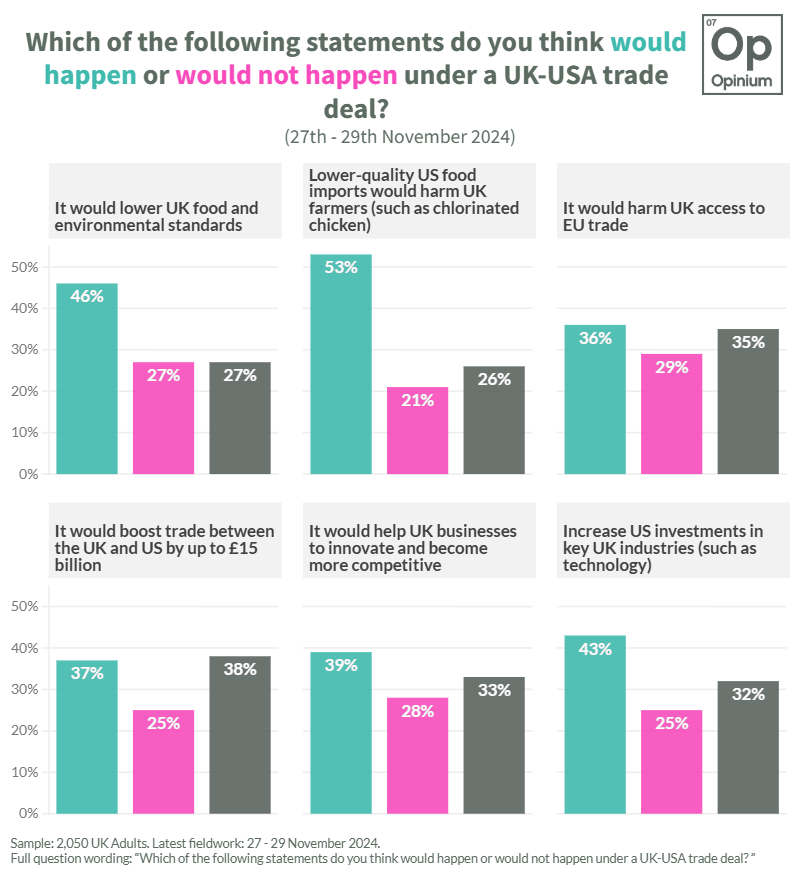Opinium Voting Intention: 27th November 2024
Downloadable data tables from our latest voting intention poll can be found here.
Approval ratings for party leaders
Keir Starmer has seen an 8 point drop in his net approval rating after a significant uptick in the number disapproving of his performance. 22% (down from 25%) approve of the prime minister’s job performance vs. 54% (up from 50%) who disapprove. This gives Starmer a net rating of -32% vs. -31% for Rachel Reeves.
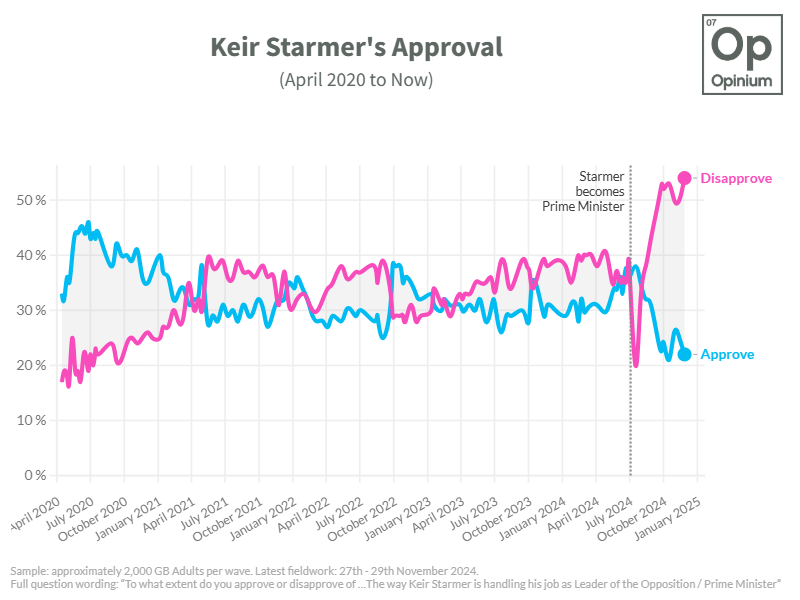
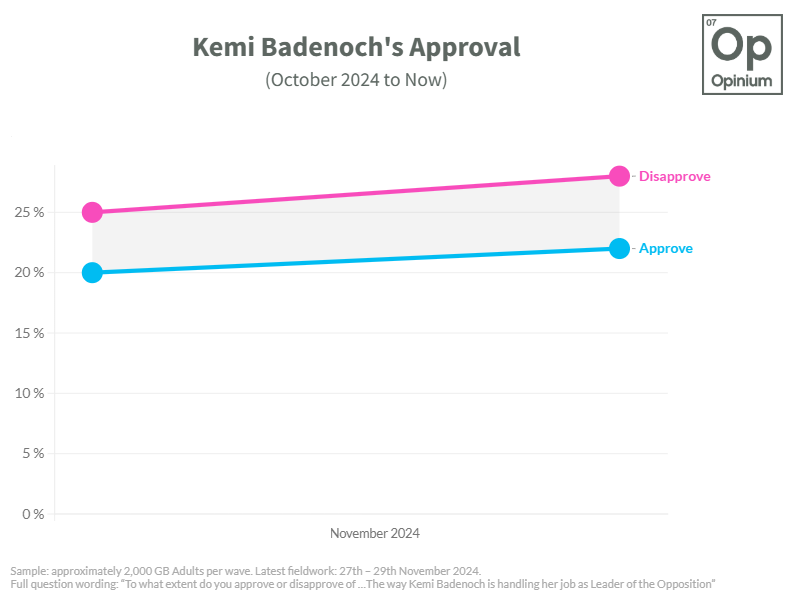
Other party leaders remain relatively steady vs. our last poll.
| Approve | Disapprove | Net approval | Change from 13-15 Nov 2024 poll | |
| Keir Starmer, Prime Minister | 25% | 50% | -32% | -8 |
| Kemi Badenoch, leader of the Conservative Party | 20% | 25% | -6% | -1 |
| Ed Davey, leader of the Liberal Democrats | 23% | 19% | 0% | -3 |
| Nigel Farage, leader of Reform UK | 29% | 37% | -9% | -1 |
| Rachel Reeves, Chancellor | 18% | 49% | -31% | N/A |
However, despite having lower approvals than Badenoch, Starmer is still seen as making the best Prime Minister compared to Kemi Badenoch. He has a 5% lead. The most-picked option is “none of these”, at 39%.
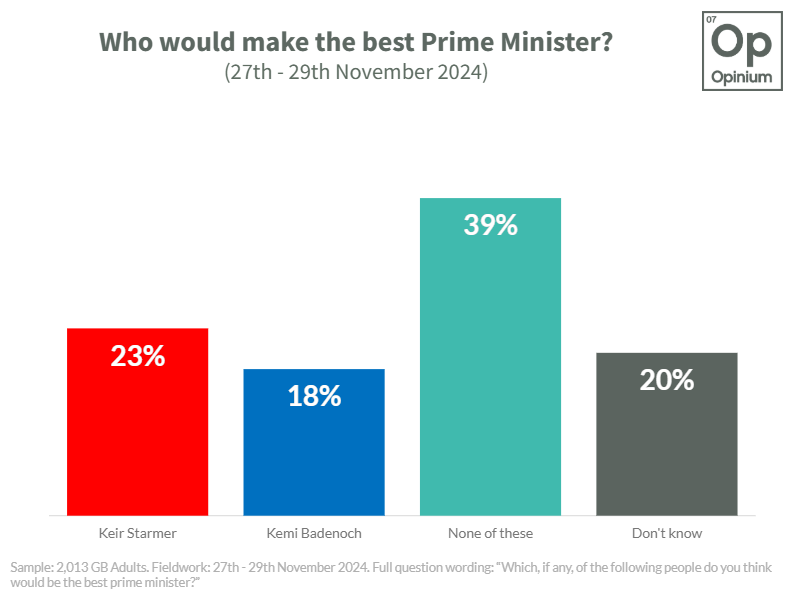
Key findings this week
- What’s made the news
- Party brands
- Which party is trusted on housing and public services
- Tax, spending and benefits
- Trade deals
What made the news this week?
| Heard a lot | Heard a little | Not really heard anything | NET: Heard a lot / little | |
| Storm Bert causes disruption and devastation across the UK | 51% | 32% | 17% | 83% |
| The protest by farmers in central London against the inheritance tax changes | 34% | 43% | 23% | 77% |
| The debate around the assisted dying bill that will be voted on in parliament this week | 33% | 42% | 24% | 76% |
| The petition calling for another general election, signed by over 2.5 million people | 31% | 36% | 33% | 67% |
| The peace deal announced between Israel and Lebanon | 20% | 46% | 35% | 65% |
| The Government announcing new plans to reduce the number of people out of work | 16% | 45% | 39% | 61% |
| British mercenary soldier fighting for Ukraine captured by Russia | 12% | 43% | 45% | 55% |
| Rod Stewart announced as playing the legends slot at Glastonbury 2024 | 11% | 35% | 54% | 46% |
Party brands
Labour’s brand strength remains largely at the level it was when we tested it after party conferences while views of the Conservative party, now that they have a new leader, are less strongly negative than they were in October:
| Do you agree or disagree that the Labour party… | Net agreement now | Net agreement on 2nd October | Change since 2nd October |
| …is in touch with ordinary people | -22% | -19% | -3% |
| …represents what most people think | -27% | -24% | -3% |
| …has similar views to my own | -25% | -23% | -1% |
| …has the nation’s best interests at heart | -15% | -13% | -2% |
| …has a clear sense of purpose | -12% | -13% | 1% |
| …knows what it stands for | -10% | -11% | 1% |
| …can be trusted to take big decisions | -22% | -22% | 0% |
| …is competent | -19% | -17% | -2% |
| …is united | -9% | -10% | 1% |
| …is tolerant | -9% | -6% | -3% |
The Tories’ scores on most issues are still worse than Labour but all have improved since party conference season, albeit from a very low base.
| Do you agree or disagree that the Conservative party… | Net agreement now | Net agreement on 2nd October | Change since 2nd October |
| …is in touch with ordinary people | -31% | -39% | 8% |
| …represents what most people think | -24% | -34% | 9% |
| …has similar views to my own | -17% | -26% | 9% |
| …has the nation’s best interests at heart | -16% | -25% | 9% |
| …has a clear sense of purpose | -12% | -27% | 15% |
| …knows what it stands for | -7% | -21% | 14% |
| …can be trusted to take big decisions | -18% | -24% | 6% |
| …is competent | -19% | -29% | 9% |
| …is united | -24% | -40% | 16% |
| …is tolerant | -14% | -24% | 10% |
| …is ready for government | -26% | -36% | 10% |
Party best at handling housing, public services
The last time this was asked was in September before party conferences. Please note: as the Tory leadership contest was ongoing at this point, the parties did not have named leaders but this week, as standard, we now say “A Labour government led by Keir Starmer” vs. “A Conservative government led by Kemi Badenoch”.
On housing costs, Labour remain in the lead albeit by smaller amounts than when this was last asked while the Conservatives are marginally ahead on reducing the costs of mortgages (22% vs. 20%).
| Labour | Conservative | Neither | Labour lead | Labour lead in September | Change in Labour lead | |
| Reducing the costs of mortgages | 20% | 22% | 37% | -1% | 6% | -7 |
| Reducing the costs of renting | 25% | 17% | 40% | 8% | 16% | -8 |
| Housing for first time buyers | 24% | 20% | 36% | 4% | 11% | -6 |
| Housing for low-income households | 30% | 16% | 36% | 13% | 19% | -6 |
| Long-term planning for future housing | 25% | 18% | 37% | 7% | 11% | -4 |
Labour is on firmer ground when it comes to running and paying for public services, although again their lead is smaller than in September on all measures apart from getting good value for money out of public services.
| Labour | Conservative | Neither | Labour lead | Labour lead in September | Change in Labour lead | |
| Allocating funding to public services | 29% | 20% | 32% | 8% | 14% | -6 |
| Working with public sector workers (such as doctors, teachers, public transport workers) | 35% | 18% | 30% | 17% | 23% | -6 |
| Deliver good value for money for taxpayers | 26% | 21% | 34% | 5% | 2% | +3 |
| Long-term planning of future public services | 27% | 19% | 33% | 8% | 12% | -4 |
| The quality of public services (such as hospitals and schools) | 30% | 19% | 32% | 11% | 17% | -5 |
Tax, spend and benefits
Since the Budget on 30th October, the proportion saying the government should increase taxes and spending has dropped marginally while the proportion saying to cut both has increased from 17% to 23%.
The proportion saying “keep them about where they are” has dropped marginally from 33% to 31%.
| This week | 16th October | |
| Increase taxes and spend more on public services | 24% | 26% |
| Reduce taxes and spend less on public services | 23% | 17% |
| Keep taxes and spending on public services about where they are now | 31% | 33% |
| Don’t know | 22% | 23% |
Unemployed adults (35%) and economic migrants (32%) are seen as the biggest contributors to the UK’s benefits bill, followed by long-term out of work individuals (24%). Fewer cited low-income households (14%) or parents with children (9%).
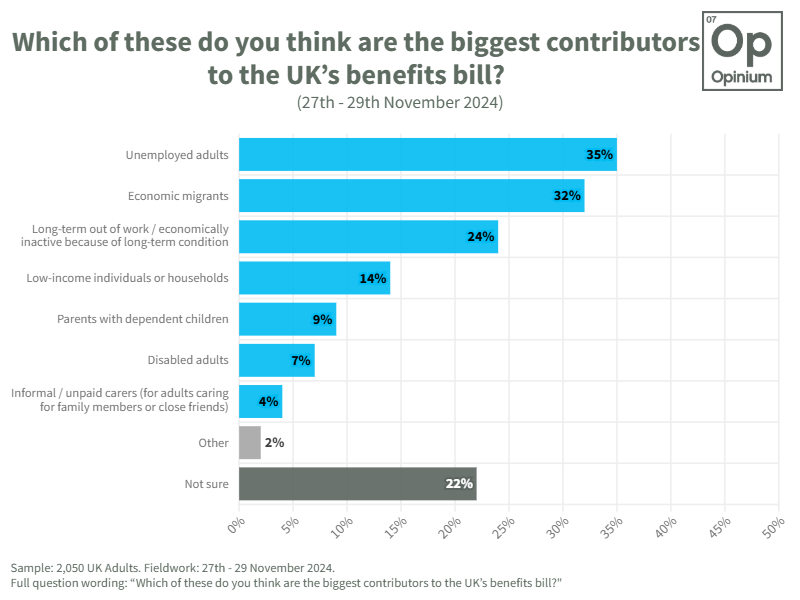
When we ask whether various groups of people receive enough, or too much, support from the government, for most groups the answer is net negative (i.e. they do not receive enough support). Since this was last asked in May 2024, many of these have become less negative:
| Enough support or too much support | Not enough support | NET | NET in May | Change in net | |
| Low-income individuals or households | 40% | 46% | -6% | -9% | 3% |
| Parents with dependent children | 49% | 35% | 14% | 7% | 7% |
| Disabled adults | 35% | 50% | -15% | -26% | 10% |
| Informal / unpaid carers (for adults caring for family members or close friends) | 24% | 64% | -40% | -47% | 6% |
| Unemployed adults | 56% | 29% | 26% | 14% | 12% |
| People who are long-term out of work or economically inactive because of a long-term health condition, illness, or disability | 44% | 41% | 3% | -10% | 12% |
| Economic migrants | 66% | 15% | 51% | 44% | 7% |
Assisted Dying
64% of UK adults support making assisted dying legal, while 19% oppose it. Support is highest among Labour (69%) and Reform (69%) voters.
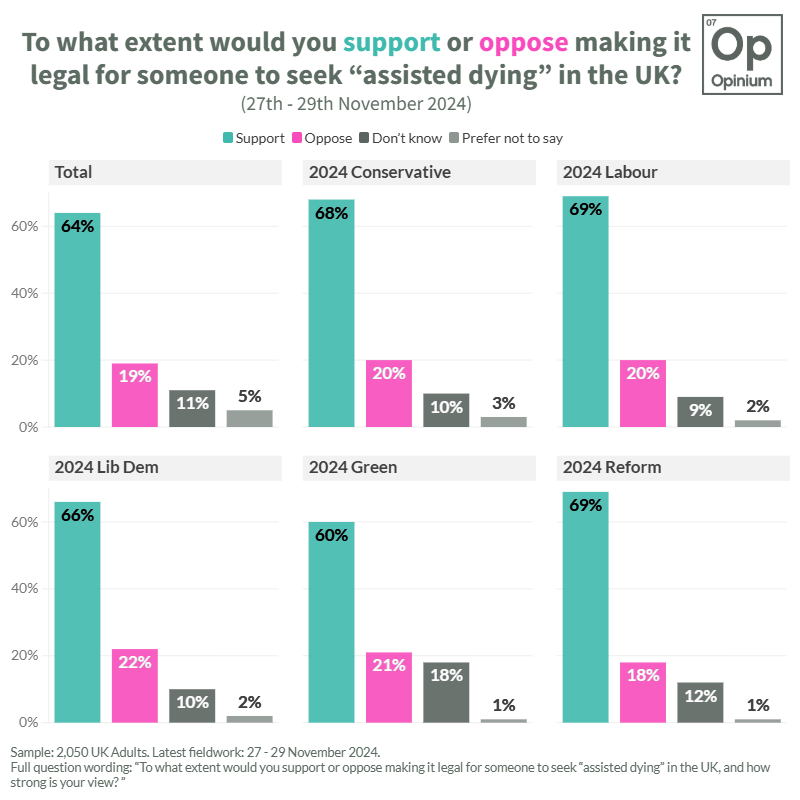
Trade deals
41% believe a trade deal with the US is likely over the next 4 years while 29% believe that it is unlikely.
However, a plurality believe that it would lower UK food and environmental standards and that lower quality US food imports would harm UK farmers.
| Definitely or probably would happen | Definitely or probably wouldn’t happen | |
| It would lower UK food and environmental standards | 46% | 27% |
| Lower-quality US food imports would harm UK farmers (such as chlorinated chicken) | 53% | 21% |
| It would harm UK access to EU trade | 36% | 29% |
| It would boost trade between the UK and US by up to £15 billion | 37% | 25% |
| It would help UK businesses to innovate and become more competitive | 39% | 28% |
| Increase US investments in key UK industries (such as technology) | 43% | 25% |
